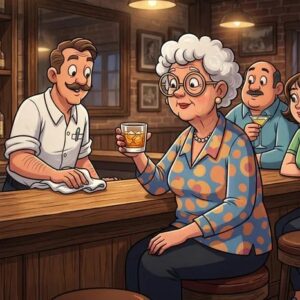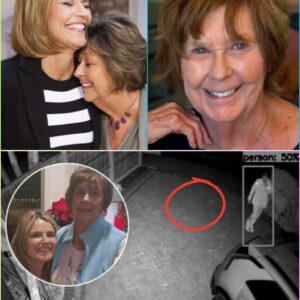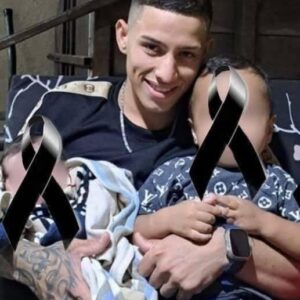It was a Tuesday, just another mind-numbing, paper-stack Tuesday. I sat at my desk, my eyes burning from staring at documents for too long, gnawing on a pen that had run out of ink. The air in my office was thick with the scent of stale coffee and filtered ventilation—the kind of smell that clings to your clothes and seeps into your bones, the smell of recycled air and quiet desperation.
Then I saw it. “Sophie” lighting up my phone on FaceTime.
I smiled instinctively. It was probably a vacation update. Maybe she’d show me a bracelet she’d bargained for, or some weird, colorful snack with a name I’d butcher trying to pronounce. The whole trip had been her idea—joining my parents, my brother Mark, and her cousins on a sightseeing break three states over.
It lined up perfectly with her spring break. I couldn’t go. Neither could my husband. Work, for both of us. And I don’t fly.
I mean, I really don’t fly. Haven’t in over ten years. It’s not just a preference; it’s a full-on, crippling phobia. Sweaty hands, racing heart, the distinct, metallic taste of panic rising in my throat the second I’m near a boarding gate. Even the scent of jet fuel makes my throat feel like it’s closing.
So, we drive. We take trains. We stay grounded. That’s how I stay functional.
The point is, I wasn’t bracing for trauma. I was expecting a selfie from a street market. I answered the call, a smile already on my face.
The smile died instantly.
There was no noise. Just Sophie, my 15-year-old daughter, sitting rigid on the edge of a generic hotel bed.
“I’m tired,” she said softly. Then, “Hey, Mom.”
She paused, and her eyes, even through the pixelated screen, looked… hunted.
“Can I tell you something,” she whispered, “but promise not to freak out?”
Spoiler: I absolutely freaked out.
Not on the outside. My voice didn’t even raise a decibel. But inside, it was a full-blown, five-alarm internal meltdown. “What’s going on, honey?” I asked, my voice terrifyingly calm as I slowly got to my feet.
She turned the camera. Her leg was resting on a hotel pillow. It was swollen, red, and a deep, angry purple. The skin was stretched taut along her ankle and shin. It wasn’t just bruised; it was ballooned. It looked wrong.
“I think I broke it,” she said, her voice flat.
My mind blanked. “What do you mean, you think you broke it?”
“I fell yesterday,” she replied. “On the stairs at that old palace place. Yesterday.”
I sank slowly back into my chair, like gravity had suddenly doubled. “Yesterday? Who’s looked at it? Where is everyone?”
“Grandma, Grandpa, and Uncle Mark,” she said. “They… they didn’t think it looked that bad. It wasn’t really swollen at first. They figured it was just bruising.”
I blinked, the information failing to compute. “So… they didn’t take you anywhere? To a doctor?”
She shook her head, her hair falling over her face. “No. We kept going. I just… walked through it.”
I shut my eyes, a cold sickness rising in my stomach. “How long, Sophie? How long did you walk?”
“Three hours? Maybe more.”
“Three… hours.”
She nodded, finally looking at me. “They told me I was overreacting.”
That line. That classic, familiar line. “They said I’d feel better once the tour was over,” she added, her tone so casual it made me want to scream. “And now… now it hurts a lot more.”
My voice was ice. “Where are they now, Sophie?”
She hesitated, and that’s when I new. “Out. They… they said I could stay at the hotel and rest.”
I froze. “You’re by yourself?”
She nodded again, a small, jerky motion.
“In another state. Alone.” I stared at the screen, at my child, who was clearly in agonizing pain and had been abandoned.
“Hey,” I said, my voice sharp, professional. “Don’t move. I’m coming to get you.”
“What? Mom, you don’t have to…”
“I do. But you’d have to fly.”
“I’m aware.”
She blinked. “You haven’t flown since…”
“I know.” I was already on my laptop, my fingers flying across the keys. “I’m already checking flights.”
This time, she didn’t argue. Her voice grew quiet. “Okay.”
I hung up. I found one flight. One single, non-stop seat, leaving in 90 minutes. There was no time for fear. No time for logic. No time for anything but motion.
I booked it.
Then I called my parents. Voicemail. Tried again. Voicemail.
I called Mark. He answered, chipper. “Hey, Erica! How’s it going?”
“You left Sophie alone in a hotel room with a possibly broken leg.”
The chipper tone vanished. “Whoa, hold on. She said she was fine. She’s 15, she can…”
“She can’t walk, Mark. She told you it hurt yesterday, and you made her walk for three hours.”
“We didn’t make her. She’s always been a little sensitive, come on. It’s probably just a sprain. The swelling didn’t even start until last night.”
“Sensitive,” I repeated. The word felt like acid on my tongue. “You saw her leg and you left her alone because she ‘couldn’t move’?”
He sighed, a sound of pure, unadulterated annoyance. “You’re blowing this out of proportion. Just like you always do.”
There it was. Always. Me. Her. I hung up without another word. I didn’t have time to shout.
I grabbed my bag, shut my laptop, and bolted. My boss looked up as I burst into his office, halfway out the door.
“Family emergency,” I said. “I have to go.”
“What kind of emergency?”
“The kind where I leave right now.”
He frowned. “You were just assigned…”
“I know. I’m sorry.” I didn’t wait to hear the rest. I was already in the elevator, booking a cab. In the cab, I texted Sophie. I’m coming. Don’t take anything. Stay in bed.
She replied with a single heart emoji. I stared at that tiny red heart the whole ride to the airport, a single point of focus in a sea of rising panic.
I ran. Through check-in, through security. Sweaty, disoriented, fighting the irrational, screaming itch in my brain to turn back, to get on solid ground. But I didn’t. I ran like I was being chased.
Maybe I was. Chased by the ghost of every time I’d been told I was too sensitive, too much, too scared.
I made it to the gate with minutes to spare. No checked bags, no clean shirt, just me, my credit card, and a phobia I didn’t have time to entertain.
I hate flying. I really, really hate it. But I hate what they did to her more.
So, I boarded the plane. I didn’t shout. Not yet.
But four days later, they were the ones screaming.
The woman next to me was asleep, her forehead against the window and a bag of pretzels resting on her chest. I envied her. I hadn’t unclenched my jaw since takeoff. My palms were damp, my knees locked so tight they ached. Every small bump of turbulence made my stomach flip, and I had to physically grip the armrests to stop myself from vibrating.
I stared straight ahead, like I was being tested. I was. Not by the turbulence, but by me. By every voice in my head telling me this was an overreaction, that I was being dramatic, that I’d land and Sophie would have a simple sprain, and they would all laugh.
That voice sounds a lot like my mother’s.
I hadn’t flown in over ten years, not because I didn’t want to, but because I couldn’t. The moment my foot touches an airport floor, my chest tightens. My brain loops through every awful flight I’ve ever had, a highlight reel of my own shame. Especially the one when I was ten, sobbing from turbulence, gripping the tray table like it could save me.
My brother, Mark, filmed it on my dad’s giant 80s camcorder. Years later, he added explosion sound effects and played it at Thanksgiving. Everyone laughed. I was still just a child. I remember my mother’s voice, sharp and embarrassed, “Erica, you really need to grow out of this.”
I never did. I just stopped putting myself in situations where people could see me panic.
Mark is three years older than me. The golden child. Athletic, loud, always the star of every backyard barbecue. He had the kind of energy that filled a room and never once questioned whether it should.
I, on the other hand, was allergic to half the backyard—cats, pollen, grass. Loud noises gave me headaches. Heights made me dizzy. My knees hurt after too much walking. I once fainted during a mandatory family hike from heat exhaustion. My mom gave me half a bottle of water and told me to “toughen up.”
Everything I did was seen as a ploy for attention, a scheme, a performance. No matter how calmly I stated a fact about my own body, I was always “being too sensitive.” If I cried, it was fake. If I got scared, it was embarrassing. If I asked to stay behind, I was selfish. They called me a “drama queen” before I even hit double digits.
Mark, meanwhile, could sprain a pinky and be carried home like a war hero. The rules were different for him. They still are.
I didn’t talk much growing up. I didn’t see the point. I just watched. I learned the patterns. I stopped reacting. And then I got out. I studied law. I became a criminal investigator.
People were surprised. “Isn’t that kind of intense for someone like you?” Meaning: Aren’t you too delicate? Too reactive?
No. I’m not delicate. I just know what it feels like to be disbelieved. I built a career around evidence, around logic, around truth that doesn’t require permission to exist. I thought, maybe, that would be enough for them to start seeing me as capable. As strong. As someone they could respect.
It wasn’t. They still treat me like I’m seconds away from melting down in the canned goods aisle.
And then Sophie was born. She was perfect. Small and quiet and thoughtful, with this little furrow in her brow like she’d already figured out the world was a mess and was trying to fix it with kindness.
She was like me.
From day one, I swore I’d protect her. When my dad joked, “Here comes Drama Queen 2.0,” I shut it down. When Mark’s daughter, Haley, got praised for being “feisty” while Sophie got told she was “too emotional,” I said, “No. Not on my watch.”
At least, not while I was in the room.
But kids notice the silences. They feel what isn’t said. And they internalize it, just like I did.
So when Sophie asked to go on this trip with my parents, Mark, Haley, and her other cousin, Ben, I hesitated. Not because I didn’t want her to go, but because I couldn’t. Flying makes me sick, not just in my body, but in my mind. It’s one of those unspoken truths in our home: Mom doesn’t fly.
She begged me. She really wanted to go, to bond with her cousins. She promised she’d call every night. My mom assured me, “Don’t worry, Erica, we’ll take good care of her.” Mark chimed in, “We’ll keep an eye on her.”
Then came the ask. “Could you help cover Haley and Ben’s extra plane tickets, since they’d be helping out with Sophie?” It was framed like they were doing me a favor.
I sent the money. I packed Sophie’s suitcase myself—allergy meds, backup charger, Band-Aids, snacks. I kissed her goodbye in the driveway and waved with a smile that didn’t quite reach my eyes.
I had a bad feeling. But I brushed it aside, because part of me wanted to believe they’d changed. That they’d see Sophie for who she is, not as a reflection of the daughter they never understood.
The plane gave a hard jolt. The woman next to me snored right through it. I clenched the armrest tighter.
I couldn’t stop picturing Sophie on that hotel bed, trying not to cry, saying, “it hurts more now.” Saying she fell yesterday. That they made her walk for three more hours.
“They told me I was overreacting.”
That line destroyed me. She got that from me. Not because I ever said it, but because I lived it. I spent my whole childhood pretending I was fine just to keep the peace.
I let her go with them. I trusted them. They didn’t just fail to care. They were repeating the pattern.
The seatbelt light dinged. We were beginning our descent. My stomach twisted, but for the first time in my life on a plane, I felt something stronger than fear.
I felt rage.
They think I’m overreacting. That I’m going to arrive and make a big scene, a “drama queen” performance.
They’re wrong. This isn’t a scene. I didn’t stay grounded for a decade because I was afraid of flying. I stayed grounded because I couldn’t bear what flying revealed in them.
But for Sophie, I’d fly straight through hell.
By the time I reached the hotel, I’d nearly forgotten how to breathe. I didn’t know what I was expecting. Maybe my family, back from their “tour,” looking sheepish. Maybe my parents, asking for forgiveness.
What I didn’t expect was for Sophie to open the door herself.
She looked pale, still in her pajamas, hair tangled. But she was upright, sort of, leaning heavily into the door frame as if it was the only thing holding her up.
“You actually came,” she said softly.
That shattered me. Not “Thank you,” not “Help me,” not even “Finally.” Just… surprise. Like she hadn’t truly believed I would. Like I was a person who made promises I didn’t follow through on.
I gently wrapped my arms around her. “Of course I came,” I whispered, my voice thick. “You’re the only reason on this planet I’d get on a plane.” I pulled back. “Okay. Time to get that leg looked at before it starts glowing or talking to us.”
It took us fifteen minutes to get her shoes on. Half of that was me arguing that she only needed one. Her foot looked like it had swallowed a baseball.
While I was tying the lace on her good foot, I asked without thinking, “So, how did it happen exactly? Stairs, right?”
I expected a sheepish “I tripped” or something about slippery shoes. Instead, she went quiet.
“It wasn’t… really a fall,” she said, staring at the carpet. “Ben pushed me. As a joke.”
I looked up, slowly. “What?”
“He didn’t mean to. I was taking a picture and he shoved me, like he does all the time, but I missed a step and… then I was on the ground. They saw it. All of them.”
My heart didn’t sink. It turned to stone. “They saw it.”
She nodded. “Grandma said I was being dramatic. Uncle Mark told me to stop crying because I was ‘scaring the tourists.’ Grandpa asked if I’d twisted it before the trip.”
“And you didn’t tell me that on the call because…”
She hesitated. “Because I thought it would go away. And… I didn’t want to make a thing out of it. I didn’t want to get Ben in trouble.”
I stood up. “Sophie. Someone pushes you down a flight of stairs and your leg swells up like that, you don’t protect them. Not even if they’re family. Especially if they’re family.”
She looked away.
“When the hospital staff asks what happened,” I said, holding her gaze, “you tell the truth. The whole thing. No edits.”
She nodded quietly. “Okay.”
We made it to the ER. They took us back fairly quickly, possibly because her leg was a color not found in nature, and also possibly because I was glaring at the triage nurse like she owed me money.
The nurse asked the usuals. Pain level, symptoms, allergies. Then came the question: “How did this happen?”
Sophie glanced at me, just once, then straightened her shoulders. “My cousin pushed me as a joke. I fell down some stairs.” She said it like a fact. Not a sob story, not a plea. Just a fact.
The nurse’s face didn’t move, but her pen started scribbling faster.
The X-ray came back twenty minutes later. Tibia fracture. Non-displaced, but definitively broken.
“You’re lucky it didn’t shift,” the doctor said, his face grim. “If she had walked much more on this…” He didn’t finish the sentence.
I finished it for him, silently. With a list of what-ifs and worst cases and a quiet, cold rage building under my skin like a second pulse. After the doctor left, I turned to Sophie.
“Tell me everything,” I said. “The full timeline.”
She started talking. She said that after the fall, she begged to go to the hospital. They said there was “no time.” It was a walking-tour day, and the tickets were non-refundable. They said she could get some ice at the end of the day.
They made her walk for three hours on that leg.
She said that when she asked again the next morning, her leg throbbing, they told her if she was really in that much pain, she could rest in the hotel. But they had a winery tour booked, and “someone had to watch the kids.”
Then they left. All of them. My parents. Mark. Even Ben, the cousin who pushed her.
“Did they say anything else?” I asked, my voice dangerously quiet.
Sophie looked at her hands. “They told me I was acting like you.”
I blinked. “Like me?”
“Like you used to be,” she whispered. “A drama queen. Afraid of everything.”
I clenched my jaw so hard I thought I’d crack a tooth.
That’s when I knew. This wasn’t just neglect. This wasn’t an accident. This was history repeating itself. This was them, actively trying to erase her voice the way they had tried to erase mine.
I stepped into the hallway and dialed my parents. My dad answered, his voice wary. “Is she okay?” He asked, not because he cared, but because he knew I’d found out.
“She has a fracture,” I said. “A doctor confirmed it.”
A pause. “Ah. Well… it didn’t look that bad at the time.”
“Ben pushed her.”
Another pause. “Now, Erica, that’s not really fair. He was just playing around. You know how boys are.”
“You all saw it happen. You saw him push her, and you walked away.”
He didn’t respond.
“I’m pressing charges,” I said.
That got a reaction. “Erica, come on. You’re going to drag the whole family into court over this? For a little accident? You’re being irrational.”
“No,” I said, and I had never been more certain of anything in my life. “I’m being a mother.”
I hung up.
Back in the room, Sophie looked at me, her eyes wide. “Was that Grandpa?”
“Yep.”
“What did he say?”
I smiled, a thin, cold smile. “He said I was being irrational.”
That made her laugh, just a little. Still shaky, still pale, but real.
And that’s when I pulled out my phone, opened my notes app, and typed: Request legal consultation. Medical neglect. Child endangerment. Possible assault.
I’m a criminal investigator. I know how to build a case. And I was about to build an airtight one against my own family.
This wasn’t just about justice anymore. It was about setting the record straight. About making sure my daughter knew, deep in her bones, that no one ever got to hurt her without consequences.
Not even family. Especially not family.
I didn’t sleep that night. My brain, the one that’s usually a mess of anxiety and self-doubt, had shifted. It was clear. It was cold. It was building timelines, requesting documents, and filing motions. That tiny voice in my head that used to whisper Do you really want to do this? was finally silent.
Yes. Yes, I did.
This wasn’t about the “drama queen” label or the childhood hiking trips. This was about Sophie, and the way her voice cracked when she said she “didn’t want to make a thing out of it”—as if being pushed down a staircase and forced to walk on a broken leg was somehow impolite to mention.
We were done letting things slide.
The footage came through three days later. The “palace” was a historical site with security cameras. My lawyer, a shark I’d worked with on a few cases, got the footage.
Tourist-filled stairs. Midday sunlight. My daughter, standing with a camera, smiling. Ben, 12 years old, charges up behind her. Playfully shoves her elbow. She flails. She slips. She crashes forward, out of frame.
Then, the part that made my stomach turn. A cluster of adults. Mark. Mom. Dad. Standing in the background, watching it happen. No one runs. No one drops a bag. Mark actually laughs. They all just stand there, like it wasn’t real. Like she wasn’t real.
I forwarded the video to my lawyer. She didn’t respond with words. Just a thumbs-up emoji and: We’ve got them. Filing.
The case meant going back. It meant court appearances, paperwork, interviews. And yes, flying. Multiple times.
The first return flight, I barely remember booking. I just remember Sophie looking at me across the kitchen and saying, “You’re flying again.”
I nodded. “Looks like it.”
“Willingly?”
“Well, not willingly. But I’m not frozen anymore, either. Turns out once you do the thing you swore you couldn’t and survive, it rewires something.”
She blinked. “So… like therapy.”
“More like revenge-exposure therapy. Apparently, maternal rage is stronger than fear of crashing.”
When we got home, the screaming started.
First, Mark. In person. He showed up on my porch, his face red, radiating that old smugness, like he still ran the family. “You’re really doing this,” he barked.
I didn’t flinch. “Yes.”
“You’re going to destroy this family! You know that, right?”
“You should have thought of that before you left a 15-year-old child with a broken leg alone in a hotel room.”
He had no answer. He just sputtered and left.
Next came my parents. They came together, always a sign they were plotting. Mom tried the guilt route. “We’re your parents, Erica. You can’t take us to court. What will people say?”
Dad tried the strategy. “Drop it now, and we can all move on from this.”
I looked them both straight in the eye. “You made her walk for three hours. You saw her fall, and you laughed at her pain. You told her she was acting like me. I’m not letting this go.”
They stormed out. But they weren’t finished.
The phone calls came next. Aunt Janine. Cousin Rachel. Uncle Marty. The “flying monkeys.”
“Your mom’s a mess.” “Mark could lose his job.” “Can’t you just move on? Don’t tear the family apart over this.”
So, I told them the truth. All of them. I emailed them the link to the footage. I attached the X-rays. I shared the doctor’s report.
By the fourth call, the tone started to shift.
“Wait… I had no idea.” “She was actually hurt?” “They left her by herself?”
Eventually, the calls faded away.
Court wasn’t a spectacle. No dramatic gavel bangs, no courtroom gasps. It was just a weary judge, some attorneys trading documents, and official findings.
But the verdict was clear. Child endangerment. Medical neglect. Failure to report an injury. All three—my parents and Mark—had charges entered into the official record.
There was no jail time. But the fines… they were brutal. The kind that make your throat tighten when you read the number.
Then came the part Mark never saw coming. He lost his job. Apparently, the school board isn’t eager to employ a P.E. teacher with a recent child endangerment charge on his record.
Six weeks later, my parents sold their house. A cousin told me they’d moved to a small rental in a worse neighborhood. They were begging family for rent money within a month.
They never asked me. They didn’t need to. They already knew the answer.
I had shut off the transfers. Closed the side account I used to “help” them. No more birthday gifts. No more “Can you help us with groceries this month?”
They were on their own. I was done.
Sophie got a little quieter after everything was over. Not withdrawn. Just… more sure of herself. Like she no longer needed to perform or defend how she felt.
One night, as we were folding laundry, she said, “I think I would have just let it go.” She paused. “But I’m glad you didn’t.”
I nodded. “You should never have to scream just to be believed.”
Later that night, she showed me a message from Ben.
Hey, I know this is late, but I’m really, really sorry. I shouldn’t have pushed you, even as a joke. I was trying to be funny, but it was stupid. I feel terrible. I hope your leg’s healing okay.
She didn’t cry. She just stared at the screen for a while. “You believe him?” I asked.
She gave a small shrug. “Yeah. I think so. I don’t think anyone told him to send that.”
And I believed her.
Her leg is fine now. Fully healed. No permanent damage, just a memory and a quiet line in the sand she’ll never let anyone cross again.
I don’t speak to my family anymore. I didn’t block them. I didn’t post anything. I just stopped replying. Stopped waiting for them to apologize. Stopped hoping they’d change.
No drama. Just silence.





